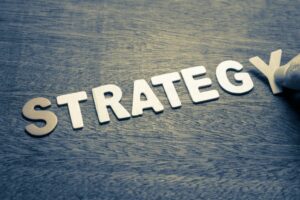Strategic Planning – Your Organizational “Me-Time”
 Abraham Lincoln once said, “Give me six hours to chop down a tree, and I will spend the first four sharpening the axe.” With this noisy world we currently work in, continually facing deadlines to meet and people to please, strategic planning is the sharp axe we so desperately need not only in guiding our work, providing safety rails as we at times feel pressured to boil the ocean in our respective fields.
Abraham Lincoln once said, “Give me six hours to chop down a tree, and I will spend the first four sharpening the axe.” With this noisy world we currently work in, continually facing deadlines to meet and people to please, strategic planning is the sharp axe we so desperately need not only in guiding our work, providing safety rails as we at times feel pressured to boil the ocean in our respective fields.
What is Strategic Planning?
In our ever-evolving landscape, a strategic plan acts as a beacon, illuminating the path to our goals – be that making a difference in our communities, expanding our influence, or pioneering new areas in our field.
A strategic plan provides a lucid direction for the journey ahead. Think of it as your organizational GPS, providing clear and reliable directions amidst a myriad of potential routes. Without this, we risk wandering off track, lured by the multitude of options or disoriented by unexpected challenges. With a strategic plan, we stay focused, resilient, and true to our core objectives.
More than just a document or a process, strategic planning is a rallying cry. It unifies everyone in the organization, creating a shared vision that everyone can get behind. This isn’t just great for productivity – it’s a powerful way to engage and motivate our teams. In an age where people are looking for meaning and purpose in their work, a compelling strategic plan can inspire and mobilize like nothing else.
A strategic plan is also a brilliant time manager. In our fast-paced lives, who doesn’t feel like they’re constantly racing against the clock? A strategic plan helps us prioritize, ensuring we invest our time and resources where they’ll have the most impact. It’s about working smarter, not harder.
And let’s not forget about the curveballs. Life has a funny way of throwing us surprises, and organizations are no different. A robust strategic plan, bolstered by scenario planning, gives us the agility to sidestep obstacles, pivot in response to changing circumstances, and seize opportunities we didn’t see coming.
Finally, a strategic plan holds us accountable. It provides measurable objectives that let us track our progress, celebrate our victories, and recalibrate when necessary. It’s a tool for transparency and accountability, ensuring we stay on track and keep our promises.
In Conclusion
In a nutshell, a strategic plan is our secret weapon for success. It’s the map that transforms our lofty ambitions into concrete reality. It’s the tool that aligns our teams, maximizes our resources, and helps us navigate the uncertainties of our dynamic world. But remember, as Abraham Lincoln wisely said, “The best way to predict your future is to create it.” So, as you craft your strategic plan, know that it’s not just about the plan itself, but the energy, passion, and diligence you put into enacting it.
Schedule a Call



